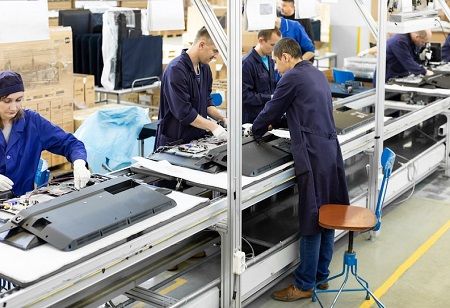
US Tariffs Not a Major Concern for Indian Manufacturers: IT Secretary
The Indian IT and electronics manufacturing industry is "not that much concerned" over the latest US increase in import duties, its biggest trade partner, and a top government official reported. Electronics and IT Secretary S Krishnan declared that the sector is following with interest the dynamic trade environment and is in continuing talks with the government.
"We've been in regular consultation with manufacturers in India. That is something that we are speaking to them about on an ongoing basis. They are not overly concerned right now, but it also depends on how this whole situation plays out. It's a dynamic situation," Krishnan said at a Cert-In event on Monday.
The comments follow after the US slapped an extra 26 percent tariff on Indian products, which comes into effect from April 9.
Despite the fresh tariffs, industry participants opine that Indian manufacturers are still better placed in relation to their international peers in the electronics business. Whereas India has to face a 26 percent duty, competing countries like Vietnam attract a 46 percent duty, China 34 percent, Indonesia 32 percent, and both Taiwan and Thailand 32 percent.
Mobile phones continue to be the pillar of India's electronics manufacturing industry, with Samsung and Apple heading the nation's exports. Though most iPhones are produced in China, India has become a major production center. Likewise, Samsung's biggest factory is in Vietnam, followed by India.
Commenting on the possible impact of the US tariffs, GX Group, CEO of Paritosh Prajapati acknowledged the added cost but noted that India retains a competitive edge.
"The 26 percent tariff will impose a notable cost barrier on Indian hardware exports to the US. However, this remains comparatively lower than tariffs levied on other major Asian manufacturing hubs. As a result, India-based manufacturing still holds a competitive edge - given that there is already a significant focus on scale, quality, and 'Make in India' incentives," Prajapati said.
HFCL, Managing Director of Mahendra Nahata said that the US tariffs should be seen as a catalyst, not a constraint.
"While tariffs challenge cost structures, they also push us to redefine our role in the global telecom supply chain. Instead of just assembling components, we must embed higher value designing AI-driven solutions, patenting energy-efficient technologies, and exporting finished innovations aligned with global priorities like climate resilience," he said.



.jpg)